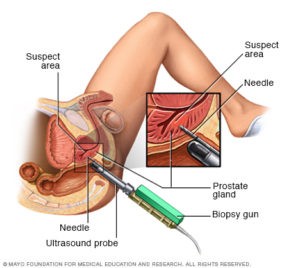The authors found that those in the lifestyle modification group had significantly lower total Prostate Specific Antigen (PSA) on repeat testing a median of 8 weeks from the first test
The problem with a prostate specific antigen (PSA) test is that it is unreliable. A jump in your PSA can cause a great deal of anxiety. And your urologist may encourage you to have a biopsy. The problem with prostate biopsies is that they too can be unreliable, can cause anxiety and come with real risks. I should say that, depending on your age, you may have some prostate cancer in your prostate. The question is if that PC will ever cause any health problems.

The solution? If your PSA jumps, don’t panic. According to the study linked and excerpted below, lifestyle modifications can reduce the jump in your PSA so that a second test eight weeks later can give you better information.
Further, while you’re considering lifestyle changes designed to lower your PSA, consider evidence-based but non-toxic nutrition and supplementation that studies show can also lower your risk of prostate cancer.
Curcumin, Green Tea Extract, Resveratrol, Exercise, and Diet and non-toxic therapies to further reduce your risk of prostate cancer.
A “core biopsy” can tell you a lot about your prostate but a biopsy can be painful and cause infections. They are not to be taken lightly. If you PSA jumps you have real incentive to follow the advice in the study below and take another PSA eight weeks from now. Good luck.
Has your PSA jumped? Have you been diagnosed with prostate cancer? If you would like to learn more about evidence-based therapies for early, mid-stage or advanced prostate cancer, scroll down the page, post a question or comment and I will reply to you ASAP.
thank you,
David Emerson
- Cancer Survivor
- Cancer Coach
- Director PeopleBeatingCancer
Recommended Reading:
“Simple, temporary lifestyle changes may be able to spare men with mildly increased prostate-specific antigen (PSA) levels from having to endure a prostate biopsy, results of a controlled study suggest.
Men who avoided eating spicy foods, drinking alcohol or coffee, and riding a bicycle had a repeat PSA reading approximately 1.5 ng/mL lower than their first reading a median of 8 weeks earlier.
Nearly half of men who adopted the lifestyle changes had a drop in PSA below the minimum threshold for biopsy, reported Alexandre Zlotta, MD…
“Spicy food induces inflammation, and inflammation directly translates into increase in PSA,” he said.
“This is just food for thought,” he added. “It’s by no means definitive, and we’re going to embark on a randomized study to test this further, but I think the noise of the signal is strong enough and robust enough to signal that we should at least pay attention.”
Zlotta explained that repeat biopsy decisions are not based on a single PSA but that the new intervention might be a good idea before a repeat PSA test.
Although PSA is a fairly sensitive marker for prostatic enlargement, it has poor specificity for prostate cancer. Nonmalignant conditions such as benign prostatic hyperplasia and inflammation can cause PSA elevations that are large enough raise suspicion of prostate cancer and trigger a biopsy, the investigators noted…
To see whether specific lifestyle modifications could affect serum PSA levels in asymptomatic men with PSA levels from 2 to 10 ng/mL and normal digital rectal exam (DRE), the authors conducted a retrospective study of 189 men. The sample included 67 men who adopted lifestyle changes and 122 matched controls who did not. Men with suspicious DRE findings or who were taking 5-alpha reductase inhibitors were excluded from the study…
The authors found that those in the lifestyle modification group had significantly lower total PSA on repeat testing a median of 8 weeks from the first test (3.50 vs 5.09 ng/mL; P < .0001), as well as a greater decrease from baseline in total PSA (1.38 vs 0.44 ng/mL; P < .0001).



